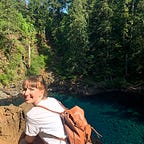My generation of journalists wants to know why our work matters
Journalism students often jump right into the craft before we learn why democracy needs us. When that happens, we miss things.
At the beginning of my career as a journalism student, I heard a lot about journalism’s importance in the abstract. Journalism is storytelling, journalism is truth, journalism is important. But important for who? Why?
I think maybe these are things we J students are expected to know inherently. And on some level, I did. That’s why I got into this, right? I love writing, but I also knew I wanted to provide a service to the public. The thing is, though, if you’d asked me even eight months ago to explain in simple terms how I would go about making space for marginalized perspectives in my work or why exactly journalism is important for a healthy democracy, I don’t know that I could have told you. I probably would’ve spitballed something generic about the power of storytelling.
My name is Ella Hutcherson, and I am a third-year journalism student at the University of Oregon and a research assistant for Lori Shontz as she develops a new course on principles of journalism for the School of Journalism and Communication. I believe this class is important because I don’t think J students can produce good work if they don’t know why it matters.
In the spring of my second year of college I took Reporting 1 with Lori. As the name implies, the class is focused partially on skills like sourcing, interviewing, and writing journalistically. But it was also the first time I learned about journalism as a public service in a tangible way. Throughout the course of the class, we talked about the principles that guide ethical reporting and why these principles matter. We discovered how diversity in a newsroom affects the diversity of perspectives being published in its work. And we thought critically about the voices being included in our stories as well as in other people’s.
At this point in my career as a student journalist, I had already had three longform features published in an on-campus magazine, and was working on a fourth. I was applying for my first internship. And by the end of the class, I was halfway done with college. Some students don’t take Reporting 1 until they’re three-quarters of the way done. That’s just way too late to only begin understanding why journalism matters and how to do it right.
And of course, it’s true that when you’re just trying to get your foot in the door, you don’t always get a choice in who or what you cover. But at student publications, like the Daily Emerald and Ethos Magazine, we actually have a lot of power when it comes to whose voices we include in our work. The trouble is, if we don’t know why this matters, we’re going to miss things.
I think a lot of students in the J school get frustrated with the flowery and sometimes ambiguous definition of our craft that we receive in the beginning of our education. We want to do the work, but we can’t do it well without the tools.
We know this is important. Tell us why.
Ella Hutcherson is a student at the University of Oregon and Clark Honors College studying journalism and sociology. She is an associate editor at Ethos Magazine, a student-run publication, a writer for Eugene Weekly, a local alt-weekly paper, and is now a research assistant of the Agora Journalism Center.
